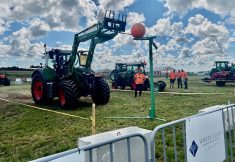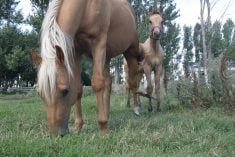Should Californians be able to require higher welfare standards for farm animals that are raised in other states if products from those animals are to be sold in California?
The U.S. Supreme Court is confronting this challenge in a suit now before it.
Pork producers are challenging a law that California voters adopted in 2018 via ballot initiative with more than 63 per cent approval. It set new conditions for raising hogs, veal calves and egg-laying chickens, whose meat or eggs are sold in California. The state represents about 15 per cent of the U.S. pork market.
Read Also

Bug farming has a scaling problem
Why hasn’t bug farming scaled despite huge investment and subsidies? A look at the technical, cost and market realities behind its struggle.
At most commercial hog farms, pregnant sows are kept in gestation crates that measure two feet by seven feet – enough room for the animals to sit, stand and lie down, but not enough to turn around. California’s law requires that each sow must have at least 24 square feet of floor space, nearly double the amount that most now get. It does not require farmers to raise free-range pigs, just to provide more square feet when they keep hogs in buildings.
The National Pork Producers Council argues that this requirement imposes heavy compliance costs on farmers across the U.S., since large hog farms may house thousands of sows, and that it restricts interstate commerce.
[RELATED] Animal welfare on social media: speak up or shut up?
The constitution’s commerce clause delegates authority to regulate interstate commerce to the federal government. In a series of cases over the past 50 years, the Supreme Court has made clear that it will strike down any state law that seeks to control commerce in another state or give preference to in-state commerce.
Farmers and animal welfare advocates understand that if California wins, states with the most progressive animal welfare policies – primarily West Coast and northeast states – will be able to effectively set national standards for the well-being of many agricultural animals, including chickens, dairy animals and other cattle. Conceivably, California might also be able to require basic conditions for human labour, such as minimum wage standards, associated with products sold in California.
Nine other states have already adopted laws requiring pork producers to phase out gestation crates. Massachusetts’s law would also apply to retail sales of pork raised elsewhere, like California’s, but its enforcement is on hold pending the Supreme Court’s ruling in the California case.
While the U.S. federal government is mute on farm animal welfare, each state has the power to regulate this issue within its borders. For example, in recent years, nine states have outlawed housing egg-laying chickens in battery cages that have been the industry standard for decades.
Since many states still permit battery cages, egg-laying chickens’ quality of life depends on the state in which they reside.
It is also clear that the state of California has no power to adopt laws that are binding on the farmers of other states. This case falls between those two points. Here’s how:
The California law says that if producers want to sell pork in California, they must raise pigs under conditions that comply with the state’s regulations. Farmers do not have to meet these standards unless they want to sell in California.
The same requirement is applied to producers located in California and those based elsewhere, so the law does not directly discriminate between states in a way that would constitute a clear commerce clause violation.
Producers of eggs and veal who sell in California are on track to implement new space requirements for their animals under the law. In my view, however, much of the pork industry appears to be in denial. Instead of working out how to comply, the National Pork Producers Council wants the courts to set the California law aside.
Even as this case moves forward, however, major producers including Hormel and Tyson have said they will be able to comply with the California standard.
Admittedly, pork farmers have invested millions of dollars in their existing facilities, and the system efficiently produces huge quantities of cheap pork. But Californians have taken the position that this output comes at an ethically unacceptable cost to animals in the system.
In considering this case, the Supreme Court will confront two questions. First, does California’s requirement constitute a burden on interstate commerce?
There is no magical formula for what constitutes such a burden, so it is impossible to know in advance what the Supreme Court will say about this point of the case. The present court has not addressed this issue.
If the court should decide that the California law does restrict interstate commerce, it then must consider whether the measure meets the “Pike test,” which was set forth in the 1970 ruling Pike v. Bruce Church, Inc. In this case, the court held that a state law that “regulates even-handedly” must be upheld unless the burden that the law imposes on interstate commerce “is clearly excessive in relation to the putative local benefits.”
Many animal welfare questions involve striking this kind of balance between ethical positions and economic consequences in a political context. It is like mixing oil and water, which makes predictions difficult.
The biggest unknown is what views the newest Supreme Court justices will bring to this case. Will today’s court support California’s right to regulate products sold within its borders, or meat corporations’ economic arguments? How many justices will see farm animal welfare as an important public concern?
I expect the court will uphold the California law and that if this happens, within five years livestock producers will be proposing national legislation setting uniform welfare standards for farm animals. It is impossible to predict now whether a national law would improve animal welfare or adopt existing welfare practices.
– David Favre is a professor of law at Michigan State University and an expert in animal welfare laws.

















